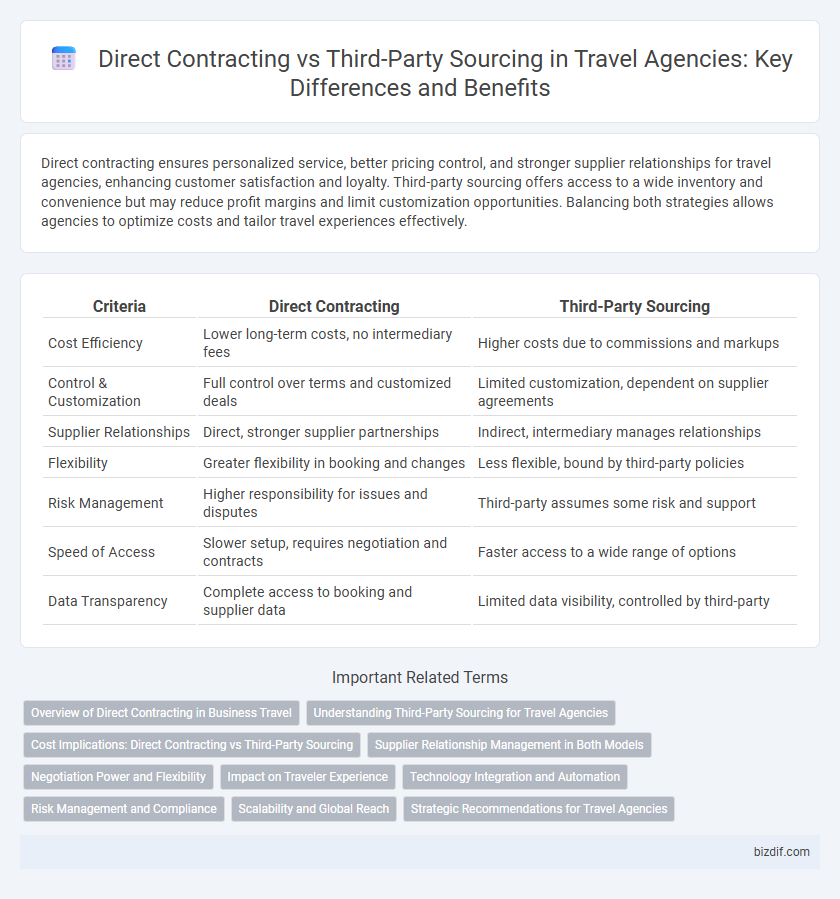Direct contracting ensures personalized service, better pricing control, and stronger supplier relationships for travel agencies, enhancing customer satisfaction and loyalty. Third-party sourcing offers access to a wide inventory and convenience but may reduce profit margins and limit customization opportunities. Balancing both strategies allows agencies to optimize costs and tailor travel experiences effectively.
Table of Comparison
| Criteria | Direct Contracting | Third-Party Sourcing |
|---|---|---|
| Cost Efficiency | Lower long-term costs, no intermediary fees | Higher costs due to commissions and markups |
| Control & Customization | Full control over terms and customized deals | Limited customization, dependent on supplier agreements |
| Supplier Relationships | Direct, stronger supplier partnerships | Indirect, intermediary manages relationships |
| Flexibility | Greater flexibility in booking and changes | Less flexible, bound by third-party policies |
| Risk Management | Higher responsibility for issues and disputes | Third-party assumes some risk and support |
| Speed of Access | Slower setup, requires negotiation and contracts | Faster access to a wide range of options |
| Data Transparency | Complete access to booking and supplier data | Limited data visibility, controlled by third-party |
Overview of Direct Contracting in Business Travel
Direct contracting in business travel involves establishing agreements directly with airlines, hotels, and car rental companies to secure exclusive rates and customized services. This approach enhances cost control, improves service quality, and allows tailored solutions to meet specific corporate travel policies. Companies benefit from increased transparency, better negotiation power, and direct access to preferred suppliers.
Understanding Third-Party Sourcing for Travel Agencies
Third-party sourcing allows travel agencies to access a wide range of travel services and inventory through external suppliers such as wholesalers, global distribution systems (GDS), and online travel platforms. This method helps agencies expand their offerings without the need for extensive contracts or infrastructure, improving flexibility and reducing operational costs. However, reliance on third-party vendors can affect control over pricing, availability, and customer experience compared to direct contracting with service providers.
Cost Implications: Direct Contracting vs Third-Party Sourcing
Direct contracting with hotels and service providers typically reduces costs by eliminating intermediary fees, enabling travel agencies to negotiate better rates and offer competitive packages. Third-party sourcing incurs additional commission fees and less control over pricing, often leading to higher overall expenses for agencies and clients. Agencies aiming to optimize profitability prefer direct contracting to maximize cost efficiency and maintain transparent pricing structures.
Supplier Relationship Management in Both Models
Direct contracting enhances supplier relationship management by fostering direct communication, greater control over service quality, and customized agreements, leading to improved reliability and tailored travel experiences. Third-party sourcing streamlines operations through access to a wide network of suppliers but may reduce transparency and limit direct influence on service standards. Effective supplier relationship management in both models requires balancing negotiation power, risk management, and consistent performance monitoring to optimize cost, quality, and customer satisfaction.
Negotiation Power and Flexibility
Direct contracting with suppliers enhances negotiation power by eliminating intermediaries, allowing travel agencies to secure better rates and customized packages, which increases overall flexibility in tailoring services to client needs. Third-party sourcing often limits negotiation leverage due to aggregated deals and standard contract terms, reducing the ability to adapt offerings quickly. Direct relationships foster greater control over inventory and pricing structures, enabling agencies to respond swiftly to market changes and client preferences.
Impact on Traveler Experience
Direct contracting with service providers ensures personalized travel experiences, higher reliability, and tailored customer support, fostering greater traveler satisfaction. Third-party sourcing offers access to diverse options and competitive pricing but may result in inconsistent service quality and limited customization. The choice between the two significantly impacts itinerary flexibility, responsiveness, and overall traveler trust.
Technology Integration and Automation
Direct contracting enables travel agencies to integrate proprietary technology systems, allowing real-time inventory updates, personalized booking experiences, and seamless payment processing. Third-party sourcing relies on external platforms with API connectivity that aggregate multiple suppliers but may introduce latency and limited customization in automation workflows. Advanced automation through direct contracts accelerates service delivery and enhances operational efficiency by reducing dependency on intermediary data exchanges.
Risk Management and Compliance
Direct contracting in travel agencies enhances risk management by enabling full control over supplier selection, contract terms, and compliance with industry regulations, reducing exposure to unreliable vendors. Third-party sourcing introduces additional compliance challenges and risk factors due to reliance on intermediaries, requiring stringent due diligence and monitoring to mitigate potential breaches or service disruptions. Effective risk management balances direct supplier relationships with comprehensive oversight of third-party partners to ensure regulatory adherence and service quality.
Scalability and Global Reach
Direct contracting with suppliers enables travel agencies to achieve greater scalability by securing exclusive rates and tailored services, which can enhance customized packages and customer loyalty. Third-party sourcing expands global reach through access to a vast network of worldwide providers, facilitating diverse destination offerings and last-minute availability. Balancing both methods allows agencies to scale operations efficiently while maintaining comprehensive international coverage.
Strategic Recommendations for Travel Agencies
Travel agencies should prioritize direct contracting with hotels and airlines to secure better rates, improved availability, and customized packages, enhancing profit margins and customer satisfaction. Establishing strong relationships through direct agreements reduces dependency on third-party platforms, ensuring greater control over inventory and pricing flexibility. Incorporating a hybrid model that balances direct contracts with selective third-party sourcing can optimize reach while maintaining strategic influence over key suppliers.
Direct contracting vs Third-party sourcing Infographic

 bizdif.com
bizdif.com